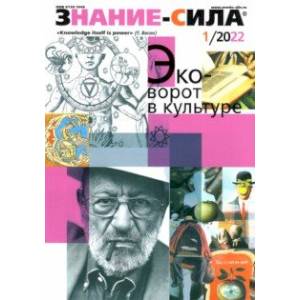Knowledge is power. 2022. № 01
Please sign in so that we can notify you about a reply
On January 5 of this year, it would have turned 90 years since the birth of Umberto Eco (1932-2016) A media historian, a philosopher, an essayist, an essayist, a publicist, a popularizer of science and a problematicizer of stereotypes, a person of encyclopedic knowledge, he did not come down to any of his cultural roles, but united all of them, and each of them helped all the others to be carried out. Even during the lifetime of IVF, it was obvious that he changed the appearance of the humanitarian knowledge of his time, and in many ways - which, in fact, his fame began in our country - and the appearance of the very mass culture that he was engaged in for many years as a researcher. He made the bestsellers and the subject of mass reading complex intellectual novels, which he himself wrote, and interested a huge number of contemporaries in different countries with his favorite Middle Ages - which he was again engaged as a researcher all his life. And this is not just a fashion, although he also created it: thanks to the IVF, many students began to come to historical faculties of universities precisely in order to make medievalism their profession. In his native Italy, IVF had an influence on minds, superior to the influence of many (not all?) Politics, and they simply called him there - the professor.
It is significant today, regardless of the extent from which his scientific works are outdated today and from what degree of delay and (not) completeness they are translated with us (do you believe - novels become obsolete much more slowly, if in general, science is activity - this is activity - this is activity - this is activity - this fundamentally focused on overcoming their own results), independently from what skepticism professionals in the field of linguistics, history, literature, history of philosophy reacted to its late, 1990s, books in which the professor, departing from semiotics as such , took up, according to the philosopher Jan Levchenko, "borders of self -determination of being through his tongue."
This is significant simply because we, who read Eco, thanks to him, have become others. He made a turn in culture as a whole. Eco -fight.
As the literary critic Galina Yuzefovich, "Umberto Eco - from among those writers who surprisingly dissolved in culture, became its soil or, if you like, by air: we habitually operate it with ideas and images, oh. We speak many things with his words - in fact, we look at the world of his eyes, while continuing to consider everything created by the public, impersonal, not belonging to anyone specifically. Just as Pushkin (or Brodsky) scattered in our speech, became the fact of the Russian language, Eco was dissipated in our thinking and became a fabric of modern culture. "
About how he succeeded all this, how his work was arranged and what he did for us today? is the main theme of this number
It is significant today, regardless of the extent from which his scientific works are outdated today and from what degree of delay and (not) completeness they are translated with us (do you believe - novels become obsolete much more slowly, if in general, science is activity - this is activity - this is activity - this is activity - this fundamentally focused on overcoming their own results), independently from what skepticism professionals in the field of linguistics, history, literature, history of philosophy reacted to its late, 1990s, books in which the professor, departing from semiotics as such , took up, according to the philosopher Jan Levchenko, "borders of self -determination of being through his tongue."
This is significant simply because we, who read Eco, thanks to him, have become others. He made a turn in culture as a whole. Eco -fight.
As the literary critic Galina Yuzefovich, "Umberto Eco - from among those writers who surprisingly dissolved in culture, became its soil or, if you like, by air: we habitually operate it with ideas and images, oh. We speak many things with his words - in fact, we look at the world of his eyes, while continuing to consider everything created by the public, impersonal, not belonging to anyone specifically. Just as Pushkin (or Brodsky) scattered in our speech, became the fact of the Russian language, Eco was dissipated in our thinking and became a fabric of modern culture. "
About how he succeeded all this, how his work was arranged and what he did for us today? is the main theme of this number
Cover:
Cover:Soft
Category:
- Category:Biographies & Memoirs
- Category:Magazines & Encyclopedia
ISBN:
ISBN:841172
No reviews found
